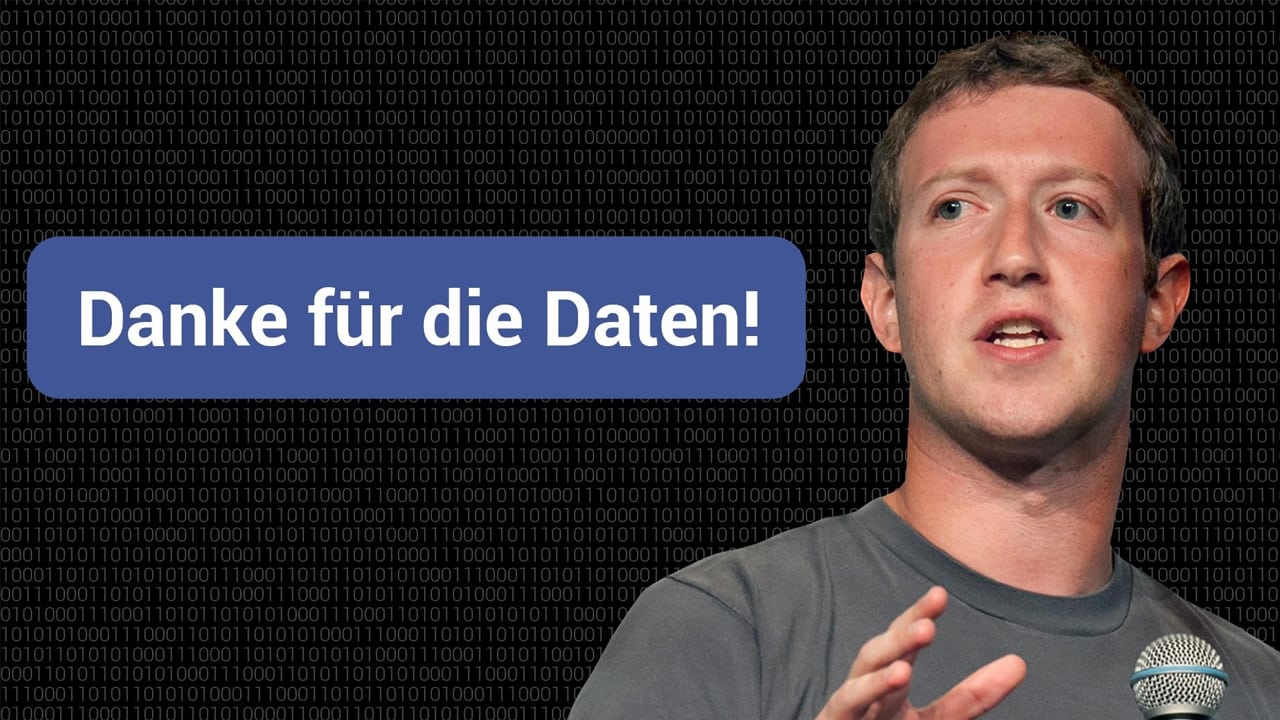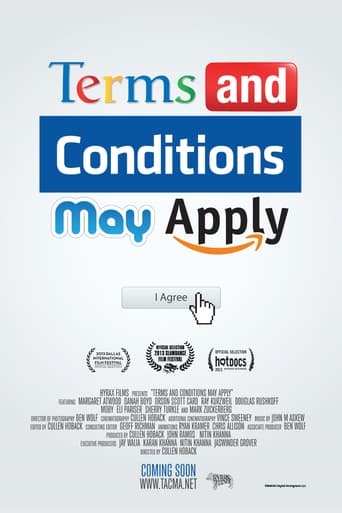Nicole
I enjoyed watching this film and would recommend other to give it a try , (as I am) but this movie, although enjoyable to watch due to the better than average acting fails to add anything new to its storyline that is all too familiar to these types of movies.
Charlie
No wonder Netflix was promoting this documentary so hard. My girlfriend watched it first and quickly recommended it to me. It truly is one of the best documentaries I've ever watched, and in my Top 5!I'll be re-watching it again next week, so hopefully I can add a bit more to the review once I re-watch it.Firstly - The graphics, animations and typography used were wonderful, it really complimented the well thought out and structured film. It gave an easy to view look at how the world is changing, and how these big companies/government agencies are a real threat to our privacy. The ONE thing missing from this Documentary, was how we (the people) can fight back against this kind of privacy violations, but then again.. can we fight back at all?
dnrobbin
Excellent review of the political and social changes in *digital* privacy for the past 13 years since 9/11. The director goes into great detail on how Websites have constantly shifted toward acquiring and disseminating more information as time has gone on since 9/11 and how this information can, and is, being revealed to the government on a regular basis. What is more disturbing is how much we thought that either a password or a privacy change on Facebook to "Friends Only" doesn't actually protect us, totally, from government or corporate dissemination of who we are. The director also points out the substantial moral problem of when we are allowed to forget our secrets and to let them lie in our past. 5 years? 10 years? 3 months? When are we entitled to have those embarrassing pictures taken at age 14 taken off the Internet search engine results (from, say, Google)? When it's been 10 years? What about adults? Do they deserve to have privacy of past-acts (good conduct or misconduct)? This is a matter not currently under substantial discussion in the Congress and the director points out that Congress is the only legislature in the US that can adequately make laws on these subjects.Again, worth seeing once so that you learn what exactly those "terms" are that you agreed to.
Steve Pulaski
With the rise of the internet, and technology in general, it's no surprise in the influx of documentaries concerning internet freedoms and the legalities of businesses that operate or function heavily online. Intersecting themes with these documentaries are usually personal freedoms, human rights, and a mindset heavily emphasizing individualism and personal accountability. With the recent NSA leak and the upcoming film The Fifth Estate, focusing on WikiLeaks and the Julian Assange controversy, don't expect this topic to go away any time soon.Terms and Conditions May Apply focuses on that lengthy, disgustingly long wall of text you're greeted with every time you register for a website, be it Facebook, Amazon, Twitter, EBay, etc. Consider iTunes, a service I have not used in about four years but one I have fond memories of. The service would update its terms and conditions roughly every five months and you'd be met with immediately when you'd try and buy a song or a piece of media after the new terms and conditions were enacted. All you had to do was check a box saying "I agree" and you could proceed with buying the song. My question: who took the time to read that gargantuan wall of text? Most of it, from what I assumed because hey, I never read it, was legal jargon and stating how I consent to not downloading or illegally distributing this property without written/expressed consent from whatever party in an absurdly verbose fashion. I didn't care and I don't think a lot of people did.But if you were to quiz me on what I was agreeing to, I wouldn't have a clue. How ignorant is that? I couldn't tell you any website's privacy policy and I'm a member of over ten mainstream sites. Director Cullen Hoback elaborates on just what we're agreeing to and how it can be used against us.Consider Gamestation, a website that, for one day, stated in its terms and conditions that by agreeing to this wall of text you'd be handing over your immortal soul to the site. In one day, the site collected thousands of souls. It's an obvious joke, but what if something was hidden in the terms and conditions, surrounded and barricaded by a wall of unrefined, wordy, confusing text that would have a serious impact if it was put into effect? It's a frightening thought, but it's usually a deeply subconscious thought that becomes even more hidden when you're playing that song on iTunes or updating your profile on Facebook.The film explores privacy policies and what the government and specific companies can see on the internet. Essentially, they can see everything. The opening line of the film is a haunting one stating, "anything that has been digitized is not private and that's the scary thing." Interviews are conducted with sociologists, journalists - one of whom Barrett Brown, who has appeared in numerous internet documentaries and is now imprisoned - and many others who state that the internet has become an invaluable resource while simultaneously an intricate tool that can just as easily be used against people.Statistics noting that companies have lost $250 billion due to fine print lawsuits and it would take you around one-hundred and eighty hours to read the privacy policies of every site you're a member of. The latter statistic reminds me of a bill that is halted in the U.S. Congress at this time called the "Read the Bills Act," which, if signed into law, would make it a requirement for Congress to, well, read the bills before they pass them. Ignore the disgusting fact that we need a bill passed for Congress to do their primary job, but what could be the reason that a bill like this needs to exist? One of my guesses is that maybe the bills are bulky and overly-long, leading to much dismay and tedium when reading and analyzing them. Perhaps this is a call for shorter legislation and terms and conditions; ones that are more simple and to-the-point rather than being daunting legal contracts that intimidate rather than inform.Terms and Conditions May Apply is a good film, albeit far too short. Hoback makes a great case for internet activism and an internet that remains open and constructed by the people rather than by corporations and big government, and things even take a surprisingly personal turn at the end when Hoback attempts to get a word in with Mark Zuckerberg, the founder of the website Facebook. The biggest achievement of the documentary, however, is that it's seventy-nine minutes long but doesn't deserve the "pamphlet" term I assign to documentaries that take a micro-look at a macro-subject. This is more of a very organized, moderately elaborate Cliff Notes version of a subject.Directed by: Cullen Hoback.
Amïn Croes (timewaster6)
I simply love this film!I saw it last night at the Aruba International Film Festival. I'm Leo's friend (short guy) that told you to go to "Jimmies Bar" ha-ha. But holy crap! This movie was really interesting! I find you have balls for actually visiting the Facebook creator, Mark Zuckerberg at his own house. There's nobody crazy enough that would do that type of thing. It's still scary to know that the government takes our private information as it were nothing. I mean we all have our rights, right? So why not stand up!? We should all stand up for ourselves. Keep up the good work, bro(& crew).Cheers!-Amin Croes

